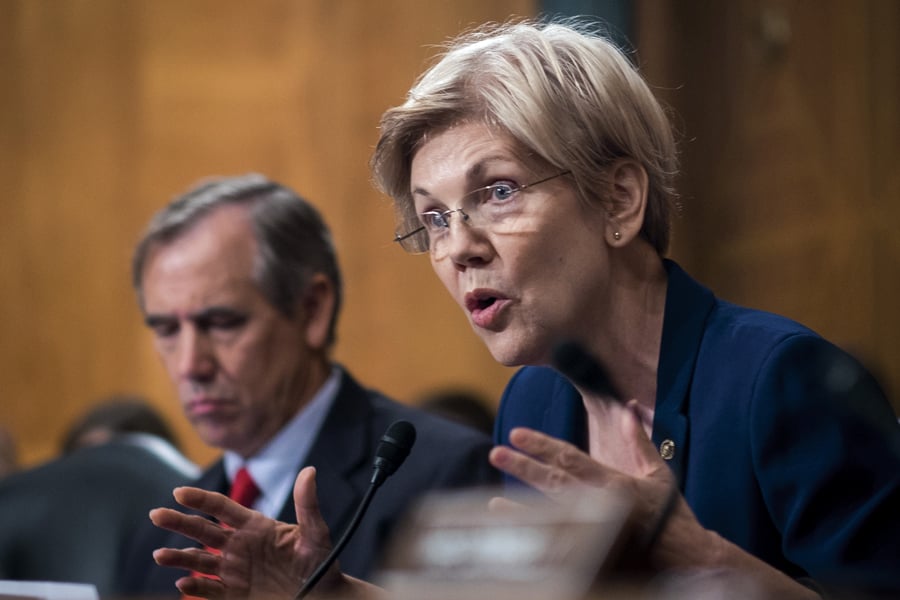

Lawmakers are attempting to warm up to the idea of a central bank digital currency as the meteoric rise of cryptocurrencies has created the context for understanding the potential value and risks of crypto.
Despite digital currency from central banks having “great promise” to improve financial inclusion, efficiency and the safety of the financial system, lawmakers are still struggling to look beyond the potential threats around digital currencies, Sen. Elizabeth Warren (D-Mass.) said on Wednesday at a congressional hearing.
“Cryptocurrency has created opportunities to scam investors, assist criminals and worsen the climate crisis,” she said. “The threats [posed] by crypto show that Congress and federal regulators can't continue to hide out, hoping that crypto will go away. It won't. It's time to confront these issues head-on.”
All witnesses during the hearing including Neha Narula, director of MIT's Digital Currency Initiative, Columbia Law School’s Lev Menand, senior counsel at Willkie Farr & Gallagher Chris Giancarlo, and Stanford University’s Darrell Duffie, argued that a well-designed and efficiently executed digital dollar would prove useful to the U.S., though the way forward is not entirely clear.
Warren, too, admitted that a digital public money could work if it is well-built, but harped on how cryptocurrency's promise of boosting everyday Americans has failed to materialize.
Witness Narula argued that the potential promise of a central bank digital currency goes beyond payment efficiency and financial inclusion, saying digital currency is an opportunity for a ground-up redesign of legacy payment systems.
“If designed in the right way, a system to create and support a digital dollar might increase competition and standardize disparate data models, leading to more interoperability and creating a platform for innovation in payments, much as the internet created a platform for innovation on top of the transfer of information,” she said.
However, there are many remaining open questions regarding how a U.S. CBDC should operate, how users might access it and how to protect consumer privacy, Narula said.
“It would be irresponsible to consider launching a digital dollar until we can make progress on these questions, but addressing them will require investment now, and extensive collaboration between academic researchers and the public and private sectors,” she said.
The hearing held by the Senate Banking Committee marked a prominent debate in Congress on the implications of a Fed-backed digital currency. The hearing also comes on the heels of countries like El Salvador moving to accept crypto as legal tender.
The uncertain regulatory environment around cryptocurrencies, concerns about safe custody and fraud, along with crypto’s lack of history as a true currency are all potential issues with Bitcoin and other digital currencies that are still keeping advisers on the sidelines.
Of advisers surveyed for a white paper by InvestmentNews Research in partnership with Grayscale Investments, 37% say they would definitely reconsider recommending cryptocurrencies once they see more regulatory involvement.
The rapidly evolving cryptocurrency marketplace and increased investor interest is pushing some regulators, like the Securities and Exchange Commission, to take ownership of the work that is needed to provide some comfort around custody issues in the crypto space.
“The bottom line message I have is that we have work to do,” said SEC Commissioner Hester Peirce.
The House of Representatives is having a hearing next week around CBDCs.

Research reveals a 4% year-on-year increase in expenses that one in five Americans, including one-quarter of Gen Xers, say they have not planned for.

Raymond James also lured another ex-Edward Jones advisor in South Carolina, while LPL welcomed a mother-and-son team from Edward Jones and Thrivent.

MyVest and Vestmark have also unveiled strategic partnerships aimed at helping advisors and RIAs bring personalization to more clients.

Wealth management unit sees inflows of $23 billion.

Deal will give US investment bank a foothold in lucrative European market.
Orion's Tom Wilson on delivering coordinated, high-touch service in a world where returns alone no longer set you apart.
Barely a decade old, registered index-linked annuities have quickly surged in popularity, thanks to their unique blend of protection and growth potential—an appealing option for investors looking to chart a steadier course through today's choppy market waters, says Myles Lambert, Brighthouse Financial.
